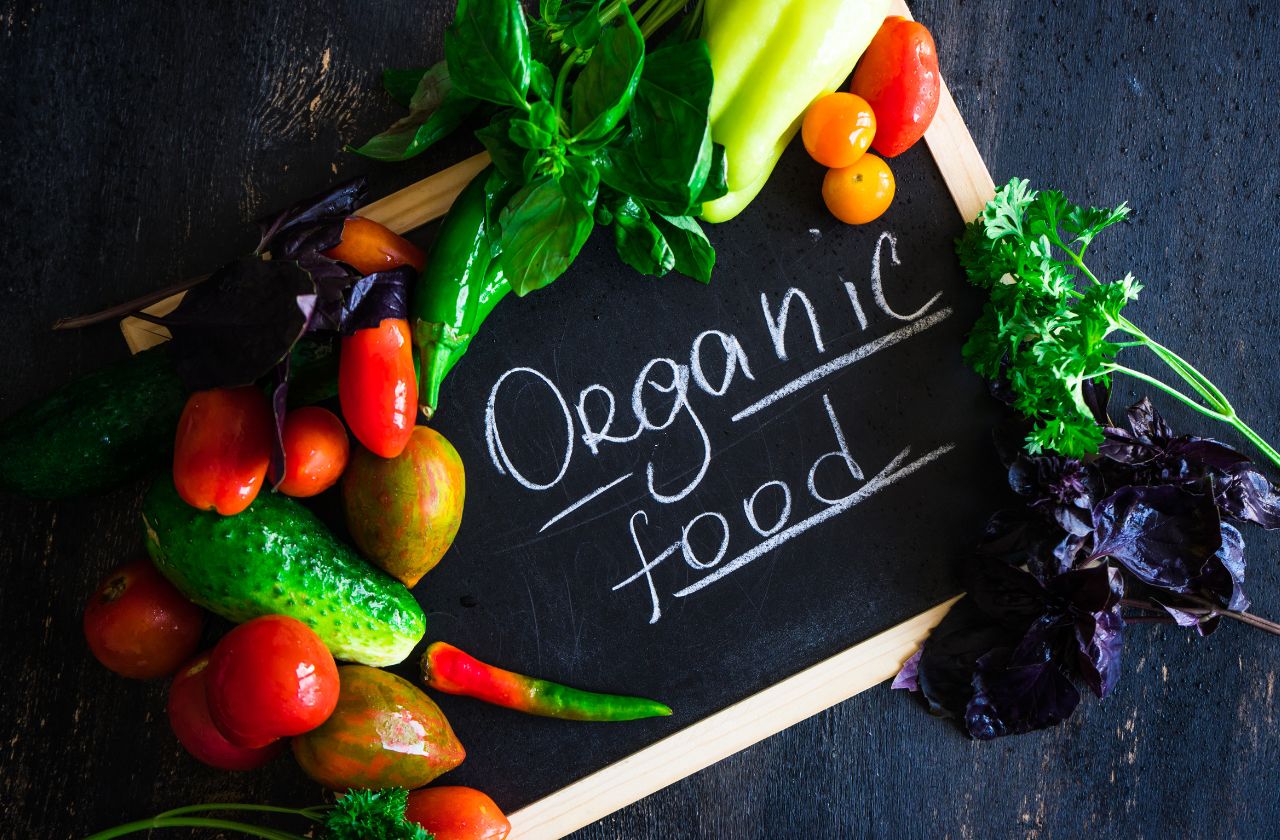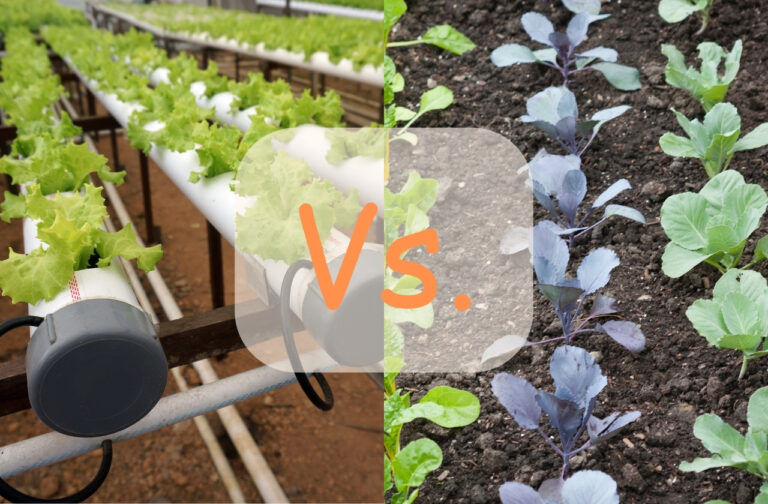10 Benefits Of Organic Food
I get commissions for purchases made through links in this post. View our Affiliate Disclaimer.
There has been a growing trend toward healthier and more sustainable food choices in recent years. One such choice is the consumption of organic food. What is meant by organic food, and what benefits does this growing method offer?
Organic food has the following benefits.
- Higher nutrient density.
- Environmentally friendly.
- Less harmful pesticides.
- No GMOs.
- Better taste.
- Support for local farmers.
- Improved livestock welfare.
- Less antibiotic resistance.
- Improved human health.
- Better for the soil.
We will explore what organic food means, the top 10 benefits of organic food, and how you can grow your own organic food at home. Whether you’re a health-conscious consumer or an avid gardener, there are many reasons to consider making the switch to organic food.
Benefits Of Organic Food
The concept of organic farming dates back to the early 20th century when farmers began to question the use of chemical fertilizers and pesticides. This movement grew in the 1960s and 70s, and since then, organic farming has become an important agricultural industry worldwide.
Organic food has numerous benefits, from being packed with nutrients to supporting small farmers and reducing the environmental impact of agriculture.
Organic food has many benefits, both for consumers and for the environment, and as you know, at My Green Terra, we are all for protecting the planet and improving health by eating healthier foods.
I have listed the top benefits that organic food offers so you can make better food choices from an informed standpoint.
- Organic food is packed with nutrients. Organic food is often more nutrient-dense than non-organic food. This is because organic farming methods prioritize soil health, which results in healthier, more nutrient-dense plants.
- Organic farming is better for the environment. Organic farming practices help protect the environment by reducing harmful pesticides and fertilizers, which can contaminate soil and water sources.
- No synthetic pesticides. Organic food is produced without synthetic pesticides, which can negatively impact human health and the environment.
- No Genetically Modified Organisms (GMOs). Organic food is also produced without the use of genetically modified organisms, which some studies suggest may have negative impacts on human health.
- Organic food has a better taste. Many people find that organic food tastes better than non-organic food, as it is often fresher and more flavorful.
- Support for small farmers. Organic farming is often done by small farmers who use sustainable farming practices. Choosing organic food supports these local farmers and helps to promote sustainable agriculture.
- Improved livestock welfare. Organic farming practices prioritize the health and welfare of animals, which can result in higher-quality meat and dairy products and a better quality of life for the animals.
- Reduced Antibiotic Resistance. Organic farming practices reduce the use of antibiotics in animals, which can help prevent antibiotic resistance in livestock animals and humans that consume the meat.
- Organic food is better for human health. Organic food is often free from harmful chemicals and additives, which can have negative impacts on human health.
- Organic farming is better for the soil. Organic farming practices help promote soil health, resulting in healthier plants and a more sustainable agricultural system.
To better understand these differences, it is useful to find out more about the differences between organic and non-organic food and growing or farming methods.
Organic Vs. Non-Organic
When considering food growing methods, there are two main categories: organic and non-organic. There are several differences in how these foods are grown, which directly affect the consumer and our planet.
Organic food is produced using natural and sustainable farming techniques that prioritize the health of the soil, plants, and animals involved in the process.
This means no synthetic pesticides, fertilizers, or genetically modified organisms (GMOs) are used. Organic farmers rely on natural methods like crop rotation, composting, and biological pest control to maintain soil health and protect crops and livestock from pests and diseases.
What is organic food? A definition of organic food would be food that is grown without the use of synthetic pesticides, fertilizers, and genetic modification.
This method of farming or growing food emphasizes the use of natural and sustainable techniques that promote the health of the soil, plants, and animals involved in the process.
In contrast, non-organic food is produced using conventional farming methods that rely on synthetic pesticides, fertilizers, and GMOs to increase crop yield and protect against pests and diseases.
These methods can negatively impact soil health, the environment, and the health of people and animals who consume the food.
Non-organic farming methods do not have the consumer or environmental health in mind, but only the profitability of the farming concern.
Most commercial farming businesses do not subscribe to organic farming methods because it is more expensive, takes longer, and there is a higher risk of crop or livestock loss, affecting the business’s profitability.
While non-organic food may be cheaper and more widely available, there are several reasons why organic food is a better choice.
Organic food is generally healthier, better for the environment, and supports small farmers who use sustainable farming practices.
Organic farming also helps reduce the use of harmful chemicals, which can have wide-ranging negative impacts on soil health and the environment.

Consumer Awareness Drives Organic Growing Methods
Consumer awareness of the benefits of organic food is driving a shift in the way that food is grown and produced.
In recent years, more and more people have become aware of the harmful effects of synthetic pesticides and fertilizers on human health and the environment.
As a result, there has been a growing demand for organic food that is grown without these harmful chemicals.
As consumers become more aware of the benefits of organic food, they are also becoming more willing to pay a premium for organic products.
This increased demand has led to an increase in the number of farmers who are transitioning to organic farming methods, as well as an increase in the amount of organic food available in grocery stores and farmers’ markets.
A prime example of this trend towards organic farming is the coffee industry, which previously did not practice organic growing methods or sustainable practices. The growing awareness of coffee consumers has created a new drive among coffee growers for organically and sustainably produced coffee.
Discerning coffee drinkers prefer the enhanced flavors of organic coffee and are willing to pay a higher price for the pleasure, and to do their part to protect the planet.
Consumer awareness also drives innovation in the food industry, as companies are developing new products that meet the growing demand for organic, sustainable, and environmentally friendly food.
From organic snacks to plant-based meat alternatives, there are more options than ever for consumers who want to eat healthy and sustainably.
Overall, consumer awareness of the benefits of organic food is driving a shift towards more sustainable and environmentally friendly growing methods. By choosing organic food and supporting organic farming practices, consumers can help to promote a healthier and more sustainable food system for generations to come.
How To Grow Your Own Organic Food
Growing your own organic food is a great way to enjoy organic food’s benefits while promoting sustainable agriculture. You can grow your own organic food on a homestead, in a suburban backyard, or even in pots in an apartment.
Here are some steps to guide you to grow your own food using organic methods.
- Make your own compost. By making your own compost, you know exactly what has gone into the compost, ensuring only healthy material and chemical-free ingredients are used. Using a countertop composter, you can make your own compost even if you live in an apartment.
- Start with Good Soil. Healthy soil is the foundation of organic farming. Start by testing your soil to determine its nutrient levels and pH. To improve health, you can then amend your soil with organic matter like homemade compost or manure.
- Choose organic seeds and plants. To ensure your garden is truly organic, choose organic seeds and plants not treated with artificial growth hormones, synthetic pesticides, or fertilizers.
- Use natural pest control methods. Growing organic food relies on natural pest control methods like companion planting and beneficial insects to protect crops from pests and diseases.
- Practice crop rotation. Crop rotation is an important organic growing principle. This involves rotating crops from year to year to prevent the buildup of pests and diseases in the soil.
- Avoid synthetic fertilizers. Organic growing uses natural fertilizers like compost and manure to feed crops. Avoid synthetic fertilizers, which can contaminate soil and water sources.
- Water wisely. Water your garden wisely to conserve water and prevent soil erosion. Use drip irrigation or soaker hoses to deliver water directly to the roots of your plants. You can also implement growing methods such as hydroponics that use less water and are more efficient growing systems.
- Harvest at the right time. Harvest your crops at the right time to ensure that they are at their peak of flavor and nutrition.
By following these steps, you can easily grow organic food at home and enjoy the many benefits of organic farming. Not only will you be able to enjoy fresh, flavorful produce, but you’ll also be promoting sustainable agriculture and reducing your environmental impact.
Conclusion
Organic food is a healthier and more sustainable option than non-organic food. It’s packed with nutrients, is better for the environment, and supports sustainable agriculture. By choosing organic food, you can avoid harmful chemicals and additives, improve animal welfare, and reduce environmental impact.
Growing your own organic food is a great way to enjoy the benefits of organic produce, and with a few simple steps, you can start your own organic garden and enjoy fresh, flavorful produce all year round.
Get more posts like this
Subscribe to our mailing list and get interesting homesteading and green living info and updates to your email inbox.
Thank you for subscribing.
Something went wrong.








Thank you for your excellent website and all the work you have put into it to help others live a more natural life. Your information on Kefir is what brought me here. Cheers 🙂